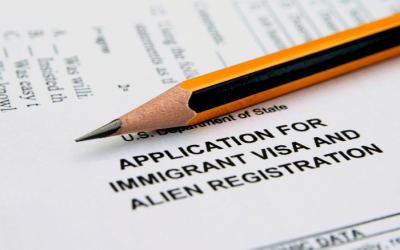
The United States Citizenship and Immigration Services (USCIS) is the agency under the U.S. Department of Homeland Security that administers naturalization and immigration services. The Immigration and Nationality Act (INA) grants citizens and legal permanent residents the benefit of petitioning for certain relatives to immigrate to the U.S.
Immediate family members, such as children, spouses, parents, and siblings, are given a preference and account for the majority of immigrant visas issued in the U.S. In 2017, 69% of immigrants who applied for green cards (lawful permanent resident status) did so through the family petitioning process.
In some cases, the paperwork needed to prove that two people are related is destroyed or missing. An immigration officer may then ask the parties involved to take a DNA test. Although the outcome isn’t always positive, DNA testing offers the potential benefits of reducing immigration fraud and making the process easier for immigrants without documentation.
What Does the USCIS Require in Immigration Cases?
To transmit U.S. citizenship at birth to a child born abroad, a parent or parents who are U.S. citizens must establish a biological relationship with their child or children. Primary legal documents typically used to prove this relationship include marriage and birth certificates and adoption papers. Affidavits may also be used. DNA testing is voluntary and generally used only when other sufficient evidence isn’t available to establish the biological relationship.
The USCIS currently doesn’t have regulatory authority to require DNA testing, per its updated 2018 policy. As a result, an immigration officer can only suggest that a person order a DNA test. The decision to do so is at the discretion of the individual officer assigned to the case. If a test is done, the USCIS only considers results of DNA testing conducted by an American Association of Blood Banks (AABB)-accredited lab like DDC. USCIS DNA tests used in citizenship cases include the following relationships:
- Father-child
- Mother-child
- Child and full brother or sister
- Child and half brother or sister
- Paternal aunt/uncle or grandparent
The DNA Immigration Test Process
The DNA immigration-testing process in the U.S. starts with three required steps, followed by five additional steps. Not abiding by these rules can result in avoidable delays and disappointment.
The First Three Important Steps
- Receive paperwork from USCIS or other agencies requesting DNA evidence of a relationship between the petitioner and beneficiary. Ordering a test prior to having USCIS paperwork can result in delays and possibly paying for another test.
- Contact the lab by telephone to initiate a DNA test, providing contact information for each person to be tested. USCIS generally gives a deadline of about 90 days for the testing to be completed, so do this as soon as possible.
- Send/fax the lab a copy of the USCIS or other paperwork requesting the testing.
The AABB Process for DNA Immigration Testing
- The lab schedules the petitioner’s DNA-collection appointment in the USA.
- The petitioner’s DNA sample is collected.
- The lab ships a DNA collection kit to the U.S. embassy/immigration office in the beneficiary’s home country.
- The embassy/immigration office collects the beneficiary’s DNA sample and ships the samples back to the lab.
- Once testing is complete, the lab sends the legally defensible (chain of custody) test results and a clear explanation of the results to the proper immigration authorities and the U.S. petitioner.
DNA Immigration Testing and Visa FAQs
Is a home DNA test acceptable for immigration?
No; the DNA sample must follow a strict chain-of-custody process to protect its integrity, as with any legal DNA test. This requires verifying and confirming the identity of the individuals whose DNA is submitted.
Is this type of test safe, reliable, and accurate?
Modern DNA testing is safe, incredibly precise, and reliable. Genetic lab testing at accredited labs such as DDC can demonstrate many types of biological relationships with up to 99.99% probability. The tests use a buccal (cheek) swab, in which a cotton swab is swept inside the cheek to gather cells for testing. Buccal swabs are noninvasive, easier to collect and ship than blood samples, and the results are identical as far as accuracy and reliability.
Is DNA testing from an accredited lab acceptable?
No; the USCIS requires that the testing laboratory is located in the U.S. and is accredited by the AABB. As an AABB-accredited testing facility, DDC meets these stringent requirements and completes thousands of these important tests each year.
Moreover, DDC is a top laboratory that meets or exceeds Canada immigration requirements issued by SCC (Standards Council of Canada) for immigration sponsorship and citizenship DNA testing.
What is the cost of a DNA test for immigration?
Typically, this type of legal DNA test costs about $499.
What is the best DNA test for immigration?
At DDC, we have many accreditations in addition to AABB and are committed to maintaining confidentiality, accuracy, and timeliness for all our tests. When you trust us with your immigration DNA testing needs, rest assured you’re receiving one of the best DNA-testing services available today.
What should I bring to my embassy appointment?
Although this may vary by embassy, these are the items you should bring to the DNA collection appointment:
- A photocopy of the U.S. citizen parent’s ID
- The passport or Consular Report of Birth Abroad (CRBA) applicant’s birth certificate
- A photo of the applicant
- A receipt from the panel physician showing payment for the DNA collection
How long does it take to do a DNA test for immigration?
You should arrive at least 15 minutes early for your interview to allow for security checks and have all documents ready. Swabbing your cheek takes seconds, but other factors contribute to the duration of your appointment.
How long does it take to get DNA results?
When you order a DNA immigration test from DDC, the results may be ready as soon as two working days after samples arrive at our lab.
How long does it take to get a visa?
According to the USCIS, the length of time varies from case to case and therefore can’t be accurately predicted for individual cases. Some cases are delayed because applicants don’t follow instructions carefully. Some visa applications require further administrative processing after the visa applicant’s interview by the consular officer. Other sites state that an immigration visa can take 18 months to 3 years, depending on the circumstances.
When you need conclusive proof of kinship for immigration, it’s important to select a lab with vast experience. DDC performs thousands of DNA immigration tests every year at 5,000 DNA-collection facilities in 20 states and 160+ countries.
Call us for a FREE confidential consultation at 800-929-0847: We’re here to help.
Do you have questions or comments about this topic? Share in the comments and we’ll answer.




0 Comments